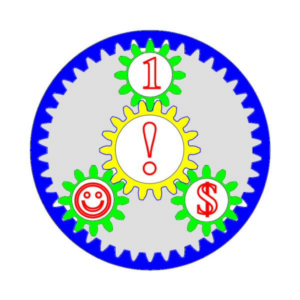Principia for Business
In this week’s guest blog, Ryszard Chciuk shares his Principia for business.
In my post The Future is Now I presented you why and how my after-sales team worked out its long-term plans, which most of business teachers call a vision. Today I am writing about the way we were going to bring us closer to our goals.
I am repeating myself: without the long-term plans, you are like a sailor who missed all his maps. You can use your compass, but you do not know where you will finally land on. Maybe it will be a deserted island. If you are a very lucky man, maybe you will land in a paradise. I am daring to give you one piece of advice: please, do not fool yourself, most probably you will break up the boat on the rocks. You and your crew have a little chance to survive the crash, it will be just pure chance.
Worse things happen if your team members do not follow the binding rules. I prefer to name them the main principles. Coming back to the metaphor. Before you abandon a port, you must equip your boat with precise maps and a compass. In 1492 Christopher Columbus had an astrolabe, compass, quadrant, and, instead of maps, his assumptions which directions to go. Finally, he was convinced he landed in “the Indies”, but fortunately for him (not for the original inhabitants), the ships made landfall on one of the Bahamian islands.
In real-life our maps are always uncertain, so before you start the journey, you should agree with your co-sailors a small number of basic rules to be strictly followed. For example, the captain is always right, you will keep watch till you are replaced by another sailor on duty, everybody is authorized to ask questions and make mistakes, the person in charge is not always right, and so on. Otherwise, all of you will fight against each other, instead of collaboration in the face of a turbulent market.
Those basic rules I name the main principles. Certainly, you are accustomed to calling them values, so I will explain myself. Most of the dictionaries, including The Cambridge Dictionary, define the first meaning of the word “value” as the amount of money that can be received for something. The second meaning of that word is the beliefs people have, especially about what is right and wrong, but it is only for the plural form. The three laws of Motion Sir Isaac Newton presented in the masterpiece called Principia (in Latin) and it is translated into Principles (in English). That’s why I ask my friends to follow the main principles instead of the values. Values and vision belong to the most overused – and least understood – words in the language of business. I want to avoid any ambiguities while talking about things of so high importance.
The most important for every organization is that all level managers and all employees subscribe to the main principles. It means, you as a manager, should employ only candidates who learnt the company values and agreed to follow those principles during the whole journey with the company. Later on, you have to observe potential breakers of the values and eliminate them. Otherwise, some employees may sabotage the whole organization. However, it’s not easy to discover the true personal values of a candidate during an interview. My advice is not to rely only on the information gathered by the human resources department. Use also your own intuition.
The most severe troubles for every kind of organization can be caused by people occupying more important posts. The company owner should keep it in mind when hiring top management. Do you remember the famous Enron case? In its annual report to shareholders, Enron listed its core values as follows:
- Communication – We have an obligation to communicate.
- Respect – We treat others as we would like to be treated.
- Integrity – We work with customers and prospects openly, honestly, and sincerely.
- Excellence– We are satisfied with nothing less than the very best in everything we do.
The actions of Enron’s senior leaders stood opposed to these core values. They quickly established a culture with values of greed and desire to maximize personal gain. It also appeared that Enron managers were supported by the renowned auditing company Arthur Andersen LLP. What was the result? Thousands of people lost jobs, their money collected on retirement plans disappeared…
I am writing this article because I want all of my friends to be aware of a potential threat. I have read about many leaders driving organizations into bankruptcy due to breaking their values. In the last decades of my life, it concerns mainly political leaders all over the world. It is unfair that dishonest leaders never pay the highest cost. Perhaps Enron’s CEO Jeffrey Skilling was one of few exceptions. He was sentenced to 24 years in prison (finally was freed after 14 years). Have you heard about reimbursing the victims of the Enron scandal?
As I explained in the post The Future is Now, my plan to build the best after-sales organization could not be executed if we employed people having bad habits. In other words, we would fail if new employees were accustomed to the principles which were opposite to ours.
Next time I will explain, what it meant in our daily work.


